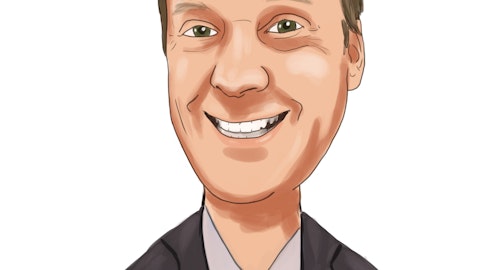Michael Hoffman: Okay.
Chris Carlson: You’ll see that laid out commodities go up and down.
Michael Hoffman: Okay. And then you alluded to the press release, you put boiler point in about hedging not currently hedging today, but future could. But I presume you would approach hedging differently than you did last year for the second and the third quarter. Could you talk a little bit about if you did it, how you would think about it? And what sort of the approach you would take if you chose to hedge?
Ben Cowart: Yes. I’ll take that question Michael. Keep in mind, there are certain things like Chris mentioned on intermediation that is just normal housekeeping with inventory that’s really not what was reflected in our second and third quarter hedge decision. We were hedging the crack spread. So when you look at that 211 crack spread we were locking that in for the purpose of protecting the limited cash we had and making a safe passage to our RD project and delivering long-term on what our goals and objectives were. Obviously hindsight is always 2020 and we clearly see that for what it is. As we look forward, we have the capacity in the company and the credit capacity to hedge as necessary and we have a team and a deep bench today that looks at the market and looks at what our exposures are and we’ll make those decisions as we go.
We believe as we indicated that the market is very strong for our business in the foreseeable future, and we’re going to maintain the exposure to the market. I think, our shareholders have kind of expressed where they’re head on that. So we hear them loud and clear, but we will also be diligent to be looking at things that other people may not see and protect our margin as we go.
Michael Hoffman: Okay. Fair enough. And then where do you stand on feedstock arrangements? April literally is around the corner. You stat your fingers it’s going to be here. So what’s the status of feedstock to support production through the facility?
Ben Cowart: Yes. And so Bart Rice is here we’ll have him, but I’ll talk about operation and let me talk more about who the suppliers not the supplier, but where we are. But we are already acquiring feedstock and getting them the third-party terminals in front of us. And Bart and his team has done a fantastic job securing those and I’ll let him speak to that.
Michael Hoffman: Thanks.
Bart Rice: Thanks. Hi, Michael. This is Bart Rice. The feedstock piece of the puzzle is the most important for our success. And we look at it as one of our most confidential important avenues as well. We have already lined up logistics with all the big ag companies and each of those ag companies have already shipped product to us. And we haven’t entained in storage in Mobile. We’ll be taking this feedstock by boards, by rail and some by truck. We’re going to focus a lot on some of the fats oils and greases that need to be preprocessed. They have the better CI score and when they extend more value to the company. But our logistics is the key to our success of the feedstock where east of the Mississippi River where we’ve got all the people that have historically been taking their feedstocks right past us to our competitors and they’re happy to find the home with Vertex now.
Michael Hoffman: Perfect. Very helpful.
Ben Cowart: Michael let me make a point here just for future reference as we move this business forward. And again, you’ve been involved with the company for a long time. So, feed origination is a strong point for Vertex. And it’s how we founded the company 22 years ago. So, we’re very excited about ability to move materials as Mark said ability to capture the right feed opportunities, negotiate that at ground level and then the geographic location advantage we have for a lot of feedstock will weigh in heavy. So, we’re very positive and bullish on the feed side of the business.
Michael Hoffman: Okay. And what I heard Bart say is there’s a focus on getting my words, dirty oils, preprocessed, that’s why you’re arranging these third-party preprocessing, but you will balance that with the cleaner soybean types as needed.
Ben Cowart: That is correct. We’re going to start up clean just for smooth operations and then we’ll start integrating.
Michael Hoffman: Okay. And then what did base oil selling prices do in the fourth quarter?
Ben Cowart: Yes, I don’t have that information. I’ve got–
Chris Carlson: It went down some, not base, but it did go down.
Michael Hoffman: Yes. Okay. Okay. And then just to be clear the question was asked earlier Vertex will seek to maximize and maintain an open profile of maximizing shareholder value. So, whatever the best way is to maximize shareholder value, you’ll do that; whether it’s sell it, keep it, and run it.





